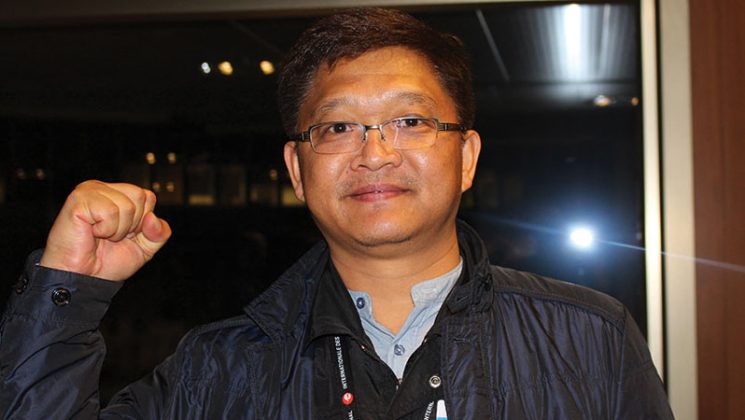Cho Sung-deok has spent a year in prison because of his trade union activity.
Mr Cho is a former airport security guard and vice president of the Korean Public & Social Services and Transport Workers’ Union (KPTU).
In his role as a guard at Incheon International airport, he was working in the public sector but was subcontracted to a private company. He and his colleagues faced low wages and poor working conditions. Sung-deok began to organise to fight back, but after going on strike, he was sacked.
Deciding to do more to protect workers’ rights, he ran for and was elected to the position of KPTU vice president.
In 2015, the South Korean government was making plans for further privatisation of public services as well as changes to employment laws, enabling poorer working conditions and protections.
Unions organised a protest on 1 May 2015. The police tried to suppress the demonstrations, using what many described as ‘disproportionate force.’ Sung-deok was involved in some of the clashes between the protesters and police. Twenty days later, he was summoned for questioning by the police.
Political prisoner
Sung-deok learned that the police had cameras following the trade union leaders at the protest. Later, a warrant to search his mobile phone was issued on behalf of four different authorities – the South Korean national intelligence service, the police, the prosecutor and the intelligence department of the army.
After questioning, the police had to decide whether they had enough evidence to hold him and then a judge had to decide if the warrant was fair or not. “For that 24 hours I was anxious and uncomfortable and actually, after it was decided and the decision was over, I felt a little bit more relaxed.”
Sung-deok was imprisoned for a number of violations of the country’s Assembly and Demonstration Act, including obstruction of public duty and an assault on a police officer.
Life as a political prisoner in South Korea is difficult. Sung-deok’s cell was smaller than others and there was no running water. Winters in South Korea get extremely cold, and the heating in his cell was on for only two hours per day. Small differences made his conditions worse than other prisoners. “They would dim the lights in other cells, but the light was on all night in my cell,” he explains.
It was a hard time, but Sung-deok was more worried about other people. “The thing I was uncomfortable about was that the workplaces I’m in charge of, the precarious workers, a lot of them had disputes going on, so what was going to happen to them if I’m gone?”
He was also worried about his father, so he didn’t tell his parents that he was in prison. “My father had just had cancer surgery, so he was in a very difficult situation. I thought it would maybe have a bad effect on his health.”
The Republic of South Korea
Population: 50,982,212
Average life expectancy: 82 years
Have they signed the ILO (International Labour Organization) conventions? Partially. They haven’t signed the conventions on discrimination and child labour.
Number on the Human Development Index: 18 (1 is the best. The UK is number 16)
Sung-deok expected to have to make sacrifices for being a trade unionist because, he explains, the movement in South Korea grew out of the fight against dictatorship in the 1980s.
After a year, he was released, and in early March 2017 it looked as though things would improve for trade unionists.
President Park Geun-hye became embroiled in a corruption scandal. The whole country began protesting against the government and she was impeached. Moon Jae-in, a former student activist and a human rights lawyer who promised better working conditions, was elected as her successor.
President Moon represented hope for trade unionists. But so far, he has not lived up to his promise.
While Sung-deok was released, several of his colleagues remain behind bars under President Moon, including Han Sang-gyun, the president of the Korean Confederation of Trade Unions (KCTU) and KCTU general secretary Lee Young-joo.
Even though he has been in prison – and some of his colleagues are still behind bars – Sung-deok is determined to continue his work supporting working people.
He says that a few years before he was imprisoned, he faced surgery and spent time reflecting on what brought him the most happiness. “I asked myself, ‘What in my life have I gotten the most from? What have I felt the most fulfilled by?’ It was the union work. So why would I give up something that fulfils me?
“I think around the world we’re doing trade union work because we feel it is helping people – that’s why we do it. It’s helping humanity.”



